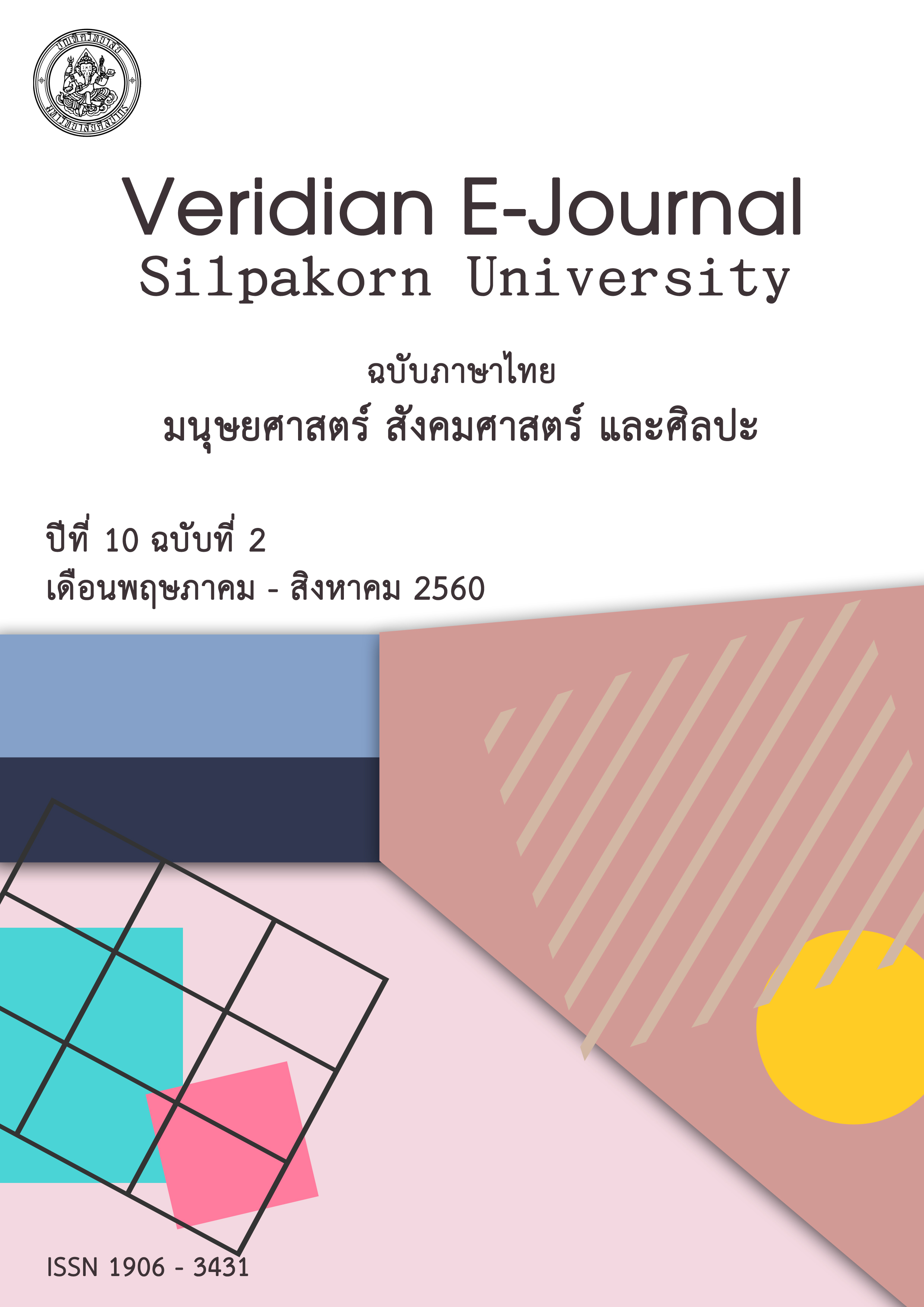การดำรงอยู่ของทุนทางสังคมในชุมชนลุ่มน้ำมูลตอนล่าง:กรณีศึกษาตำบลโพธิ์ศรี อำเภอพิบูลมังสาหารจังหวัดอุบลราชธานี
Main Article Content
Abstract
การวิจัยครั้งนี้มีวัตถุประสงค์เพื่อศึกษาการดำรงอยู่ของทุนทางสังคมมิติทรัพยากรมนุษย์ ทรัพยากรธรรมชาติ สถาบันสังคม วัฒนธรรมประเพณี กลุ่ม/ภาคีเครือข่าย ภูมิปัญญาท้องถิ่นภายใต้ระบบนิเวศเกษตร ใช้วิธีการวิจัยเชิงคุณภาพเก็บรวบรวมข้อมูลจากกำนัน/ผู้ใหญ่บ้าน 14 คน ปราชญ์ชาวบ้าน/หมอดินอาสาพัฒนาชุมชน 14 คน ร่างทรงผีปู่ตา (ข้าวจ้ำ) 9 คน ตัวแทนสถาบันศาสนา 8 รูป ตัวแทนสถาบันการศึกษา 9 คน ตัวแทนสถาบันการเมืองการ4ปกครอง 3 คน ตัวแทนสถาบันครอบครัว 10 คน รวมทั้งสิ้น 67 คน โดยการสัมภาษณ์ การสนทนากลุ่ม ใช้แบบสัมภาษณ์กึ่งโครงสร้าง เพื่อค้นพบข้อมูลเชิงลึก จากนั้นวิเคราะห์ข้อมูลอย่างจัดเรียงเป็นระบบร่วมกับการนำเสนอเชิงพรรณนาประกอบแผนที่ แผนภูมิ และรูปภาพ
ผลการวิจัยพบว่า ชุมชนโพธิ์ศรีมีทุนทางสังคม 6 มิติ ประกอบด้วย มิติทรัพยากรมนุษย์ ทรัพยากรธรรมชาติ สถาบันสังคม วัฒนธรรมประเพณี กลุ่ม/ภาคีเครือข่าย และภูมิปัญญาท้องถิ่น ซึ่งล้วนแล้วมีความสัมพันธ์ลักษณะพึ่งพาอาศัยกันและกัน กล่าวคือ มนุษย์ใช้ประโยชน์ป่าช้าสาธารณะเพื่อทำพิธีฝังศพ เผาศพผู้คนในชุมชนมาตั้งแต่อดีตกระทั่งปัจจุบันและยังคงมีความเชื่อ หวาดกลัวภูตผีวิญญาณที่อยู่ในป่าจึงไม่มีผู้ใดกล้าบุกรุกทำลาย ประกอบกับมีพิธีกรรมเซ่นไหว้ศาลผีวิญญาณปู่ตาที่สถิตในป่าช้าสาธารณะด้วยยึดโยงกับบรรทัดฐานให้ชุมชนปฏิบัติมาอย่างสืบเนื่อง หากเป็นป่าสาธารณชุมชนมนุษย์มีความสัมพันธ์ลักษณะพึ่งพิงเพื่อจัดหาวัตถุดิบมาสร้างปัจจัยสี่ภายใต้ผู้นำวางกฎห้ามตัดต้นไม้ไว้ควบคุม ซึ่งทุกคนรู้สึกยินดีพร้อมปฏิบัติอย่างเคร่งครัด เพราะด้วยวัฒนธรรมชาวอีสานให้ความเคารพในตัวตนของผู้นำมาก ทั้งถูกปลูกฝังว่าต้องทำประโยชน์ต่อส่วนรวม นอกจากนี้มนุษย์ยังมีความสัมพันธ์แหล่งดินลักษณะพึ่งพากันโดยใช้เป็นพื้นที่ทำเกษตรกรรม ตลอดจนได้นำภูมิปัญญาท้องถิ่นมาช่วยปรับปรุงสภาพแหล่งดินส่งผลให้มีคุณภาพดีจนสร้างผลผลิตอุดมสมบูรณ์ ส่วนแหล่งน้ำเน้นผนึกพลังเป็นกระบวนการกลุ่มระดับเด็ก/เยาวชน กลุ่มระดับชุมชนผ่านกิจกรรมภาคีเครือข่าย โดยนำความเป็นวัฒนธรรม ศาสนาเดียวกันของชุมชนมาถักทอเป็นน้ำหนึ่งใจเดียวเพื่อกระตุ้นให้เกิดแรงจูงใจมีส่วนร่วมดูแลแหล่งน้ำอย่างมีจิตสำนึกสาธารณชุมชนแท้จริงทุนทางสังคมที่สามารถดำรงอยู่อย่างเข้มแข็ง มีความยั่งยืนต้องอาศัยศักยภาพของมนุษย์ที่มีกลไกทั้งเป็นผู้สร้าง ผู้รักษา ผู้ขับเคลื่อนให้เกิดความสัมพันธ์ขึ้นตามกิจกรรมเชิงบูรณาการ ซึ่งพิจารณาแล้วว่ามีความเหมาะสมกับบริบทชุมชนและในขณะเดียวกันก็ไม่สร้างความขัดแย้งกับวัฒนธรรมชุมชนที่ยึดถือปฏิบัติกันมาด้วย ดังเช่นชุมชนโพธิ์ศรีที่มีผู้นำชุมชนแบบเป็นทางการ ผู้นำชุมชนแบบไม่เป็นทางการ สถาบันสังคมร่วมกันรักษาทุนทางสังคมให้ดำรงอยู่โดยนำเครื่องมือวัฒนธรรมประเพณี เครื่องมือภูมิปัญญาท้องถิ่นเข้ามาประยุกต์ใช้เพื่อพัฒนาระบบนิเวศเกษตรจนกระทั่งเกิดคุณภาพเต็มที่เพราะมนุษย์สามารถนำมาใช้เกื้อหนุนวิถีการดำเนินชีวิตของตนเอง ครอบครัว ชุมชนให้ก้าวสู่แนวทางพึ่งพาตนเองได้อย่างมีความสุข
The purposes of this research was to study the existence of social capital in terms of human resources, natural resources, social institute, culture and tradition, group/networks and local wisdom in agricultural ecosystem. The research used qualitative research methods through interview, focus group discussion, sub-district civil society forum to collect information from 14 sub-district chiefs and community leaders, 14 local wisdom people from community soil development, 9 local wisdom people from community rice development (Khao Jum), 8 representatives from religion institution, 9 representatives from educational institution, 3 representatives from political institution and 10 representative family and in total of 67 people. A semi- structured interview to collect in-depth information then analyzed through systematic content analysis along with a descriptive presentation by maps, charts and images.
According to the research results presented that Pho si community had 6 aspects of social capital which were human resources, natural resources, social institution, culture and tradition, group/networks and local wisdom aspects. Those aspects had dependable relationship which could describe that human had used public funeral wood for funeral ceremony from the past until present but they have been still believing and terrifying in ghost or spirit which they had believed that existed in the wood. As the results human had fearful to invade or destroy those public wood including they have arranged ceremony to respect those spiritual. That believing was acted as a norm for community to follow and carry out. However, community public wood and human had dependable relationship in term of supplying of resources for 4 human elements and moreover all community people had willingness to act under the rule of deforestation prohibit from community leader according to the Isan culture, the respect of community leader and being a useful for society were play as an important issue. Human also had dependable relationship to the earth through agriculture including used local wisdom to improve soil to be abundant for production. As for water resources, they use the process of youth and children group, community group and the networking through culture and religions to raise practical and realistic on awareness of water protection.
Social capital that had well-built existed and sustainable was required human to be as a significant mechanism of creator and maintenance including driven the relationship in term of integration which appropriate to community context and also not create any community culture conflicts as the model of Pho si community which had formal and non- formal community leader and social institution to protect and conserve of social capital to be exiting through applying of a traditional and cultural including local wisdom tools for developing Agricultural ecosystem because it will lead human-being to be happy and reliance in term of its-self, family and community.

